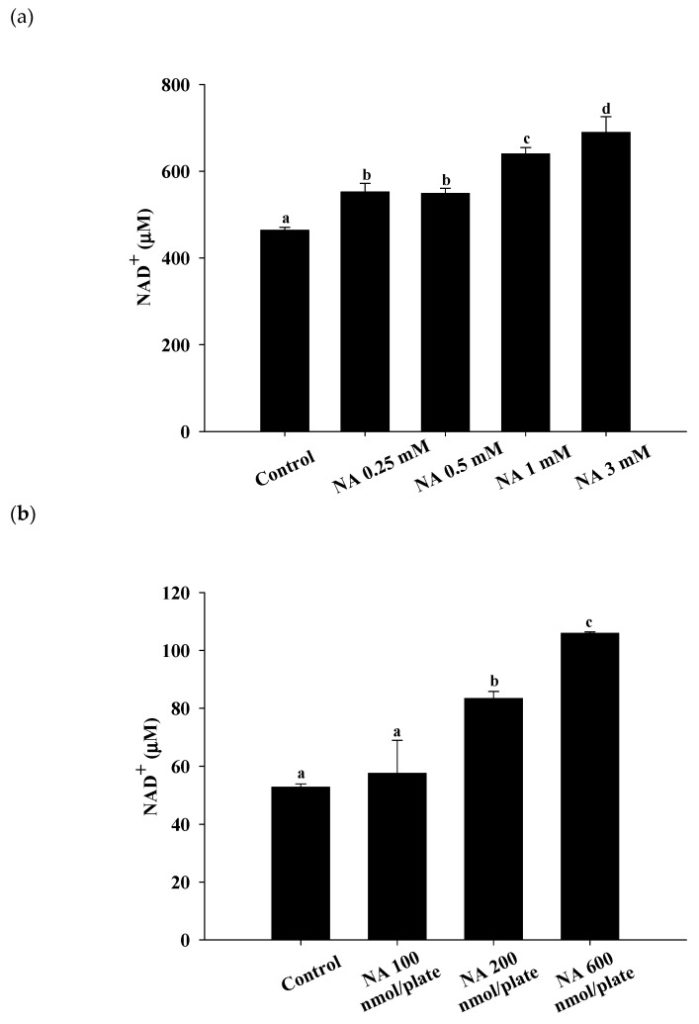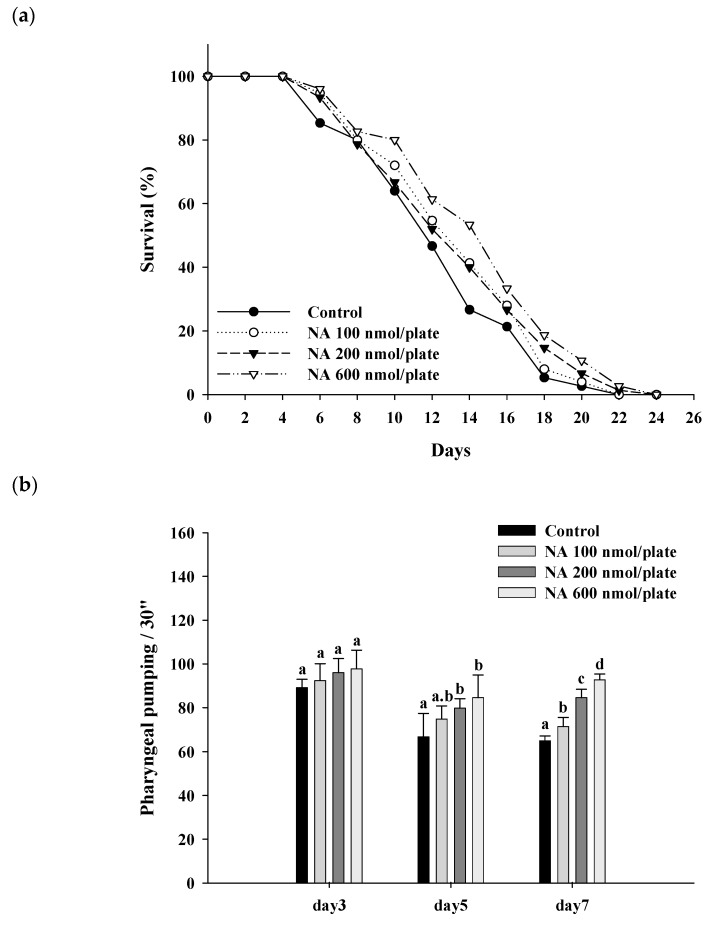Study Indicates Why B3 Vitamin Improves Roundworm Lifespan but Not Human
Scientists from Taiwan have recently published a study showing that nicotinic acid, a form of Vitamin B3 the body metabolizes to nicotinamide adenine dinucleotide (NAD+), increased lifespan in the roundworm, C. elegans, but not lifespan of human Hs68 cells.
Scientists from Taiwan have published a study showing that nicotinic acid, a form of Vitamin B3 the body metabolizes to nicotinamide adenine dinucleotide (NAD+), increased lifespan in the roundworm, C. elegans, but not lifespan of human Hs68 cells. The study demonstrated under normal circumstances in human Hs68 cells, levels of nicotinamide adenine dinucleotide (NAD+) in the cell (intracellular concentrations) stay too high for nicotinamide adenine dinucleotide (NAD+) boosting nicotinic acid supplementation to influence signaling in the nicotinamide adenine dinucleotide-sirtuin (NAD-SIRT1) pathway. Scientists believed increased nicotinamide adenine dinucleotide-sirtuin (NAD-SIRT1) signaling activity played a key role in longevity.

Nicotinic acid, a form of vitamin B3, has shown to extend the lifespan of the roundworm, Caenorhabditis elegans. These lifespan-extending effects occurred through Sir-2.1, a sirtuin protein that required nicotinamide adenine dinucleotide (NAD+) for its longevity-promoting properties. This study aimed to find out whether this activity in the C. elegans model could translate to human cells. The researchers thus proposed (hypothesized) that nicotinic acid, a molecule that the body metabolized to nicotinamide adenine dinucleotide (NAD+), could extend lifespan in C. elegans and human Hs68 cells.

The scientists of this study first showed nicotinic acid administration to human Hs68 cells and the roundworm, C. elegans, significantly increased levels of nicotinamide adenine dinucleotide (NAD+) in cells (intracellular levels). Then, to estimate the lifespan of human Hs68 cells, the scientists incubated the human Hs68 cells with varying concentrations of nicotinic acid. The measurements indicated that nicotinic acid administration could not extend the lifespan of human Hs68 cells. Thus, the data obtained in this experiment negated the second part of what the group proposed (hypothesized): nicotinamide adenine dinucleotide (NAD+) supplementation with nicotinic acid could extend the lifespan of human Hs68 cells. To estimate the ability of different concentrations of nicotinic acid administered to extend lifespan in the roundworm, C. elegans, scientists spread different dosages of nicotinic acid to the surface (called ‘medium’) that the roundworms grew on. They found the average lifespan of roundworms increased approximately 17% and that the middle lifespan value (the median lifespan) increased four days. Additionally, the researchers used body markers, including pharyngeal pumping, autofluorescence, and body bends, to determine effects on ageing. They found with nicotinic acid administration to the roundworms, pharyngeal pumping increased, autofluorescence decreased (higher autofluorescence indicated aging), and body bends increased significantly. Thus, this provided evidence that nicotinic acid supplementation to the roundworm C. elegans improved fitness of the roundworms.
Then, to reveal the molecular mechanism through which these observations took place, the scientists measured the effects of nicotinic acid on nicotinamide adenine dinucleotide (NAD+) levels, lifespan, and physiological indices of mutants for the sirtuin protein (sir-2.1) of C. elegans. They found nicotinic acid administration to the roundworms increased levels of nicotinamide adenine dinucleotide (NAD+) significantly in these mutants. At the same time, the lifespan of these sir-2.1 protein mutants did not extend significantly. Hence, the ability for nicotinic acid administration to extend lifespan in roundworm C. elegans disappeared in the sirtuin protein, sir-2.1, mutant, indicating nicotinic acid prolongs the lifespan in roundworms via the sir-2.1 signaling pathway. Using the three physiological measurements of pharyngeal pumping, body bending, and autofluorescence, the researchers found the improvements in these measurements disappeared in the sirtuin protein (sir-2.1) mutants. This suggested the effects of nicotinic acid on these three markers of aging are mediated through the sirtuin protein (sir-2.1).
In the human Hs68 cells, the scientists found nicotinic acid increased levels of nicotinamide adenine dinucleotide (NAD+). Based on determining the concentrations at which nicotinamide adenine dinucleotide (NAD+) associated with (acted as a cosubstrate with) the sirtuin protein in human cells (SIRT1), the researchers proposed (hypothesized) that the levels of nicotinamide adenine dinucleotide (NAD+) usually in the human Hs68 cells (intracellular concentrations) are higher than the maximal concentration needed for sirtuin SIRT1 activity. Therefore, increasing nicotinamide adenine dinucleotide (NAD+) levels would not have increased sirtuin SIRT1 activity in cells. Thus, the longevity-enhancing effects of the sirtuin SIRT1 activity would not have taken effect with nicotinic acid supplementation in human Hs68 cells.
The team then ran further experiments using the roundworm, C. elegans, and demonstrated the lifespan enhancing effects of nicotinic acid administration came from increasing cellular levels of nicotinamide adenine dinucleotide (intracellular NAD+ concentrations). Therefore, in the roundworm, C. elegans, increased levels of nicotinamide adenine dinucleotide (NAD+) with nicotinic acid administration would act via the sirtuin protein (sir-2.1) to facilitate enhanced longevity. In human Hs68 cells, the study did not find that nicotinic acid supplementation enhanced lifespan. As the team of researchers proposed (hypothesized), higher cellular concentrations (intracellular concentrations) of nicotinamide adenine dinucleotide (NAD+) exceeding the maximal threshold for increasing sirtuin protein activation may have prevented increased sirtuin protein activity in human Hs68 cells. Interestingly, the possibility existed that with low cellular concentrations of nicotinamide adenine dinucleotide (NAD+), such as in the elderly population and those with vitamin B3 deficiency, a nicotinamide adenine dinucleotide (NAD+) supplement could improve longevity. Further research was needed for scientists to make recommendations in this regard.
Moreover, multiple sirtuin proteins and pathways exist in humans on which this study did not perform experiments. For example, mammals have SIRT1-7 proteins. Therefore, the possibility remained that increased levels of nicotinamide adenine dinucleotide (NAD+) with nicotinic acid could have improved health through a sirtuin pathway not measured in this study. In other words, the maximum threshold of nicotinamide adenine dinucleotide (NAD+) to increase sirtuin protein activity could have been lower for other sirtuin protein subtypes (isoforms). The activity of these sirtuin proteins could facilitate health benefits in other ways as well. Scientists had not yet conducted research in this area, so further research will be necessary in the future to find the benefits of nicotinamide adenine dinucleotide (NAD+) boosting supplements, like nicotinic acid, on health and aging in humans.

